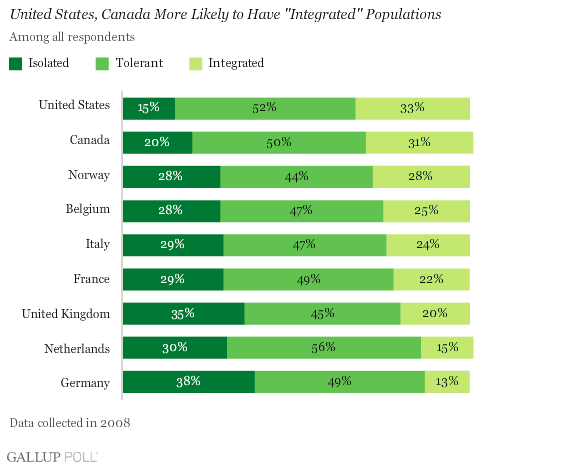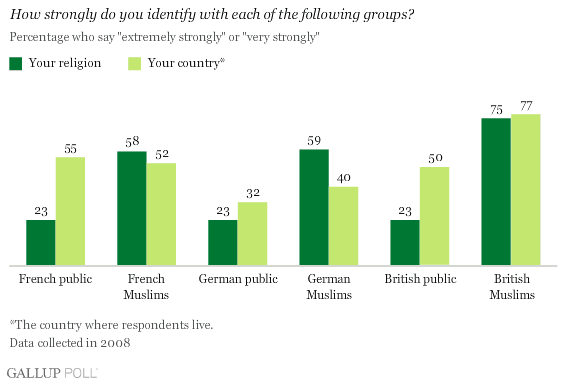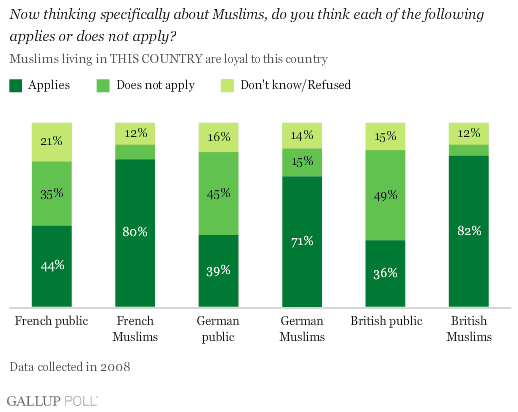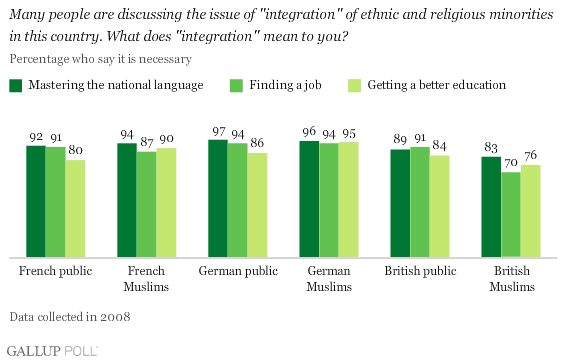WASHINGTON, D.C. -- In its first annual report on the state of faith relations in countries spanning four continents, Gallup and the Coexist Foundation find Americans and Canadians are more likely than European respondents surveyed to be classified as "integrated."

Other key findings from The Gallup Coexist Index 2009: A Global Study of Interfaith Relations show that almost 4 in 10 British (35%) and German (38%) respondents are considered "isolated."
Gallup defines "isolated" respondents as those who are unlikely to be members of any particular faith group and who tend to believe in the truth of their perspective above all others. They do not want to know about other religions. They also neither respect nor feel respected by those of other faiths. "Tolerant" individuals have a "live-and-let-live attitude toward people of other faiths, and they generally feel that they treat others of different faiths with respect. However, they are not likely to learn from or about other religions. "Integrated" respondents as those who go beyond a "live-and-let-live" attitude and actively seek to know more about and learn from others of different religious traditions. They believe that most faiths make a positive contribution to society. Furthermore, integrated people do not only feel respect toward people from other faith traditions, but they also feel respected by them.
Findings from the report, disseminated in partnership with the Coexist Foundation, a U.K.-based charitable organization, are particularly relevant to the debate about the integration of ethnic and religion minorities. Specifically, the poll findings show that while European Muslims have embraced their nations, their nations have not embraced them. British, French, and German Muslims are at least as likely as their respective general populations to say they identify either "extremely strongly" or "very strongly" with their country of residence. At the same time, European Muslims surveyed are far more likely than the British, French, and German publics overall to say they identify strongly with their faith.

As religious identities are not personally relevant for many non-Muslim Europeans surveyed, it may be harder for them to understand the faith dimension of many European Muslims. For some Europeans, an identity that extends beyond citizenship may foster ambiguous allegiances. This interpretation may help explain why many among the general European populations surveyed either do not think Muslims are loyal to their countries or are unsure about their loyalty, suggesting that European Muslims remain "foreign elements" in the eyes of many among the general public. This is in striking contrast to the strong majorities among French, German, and British Muslims who think that Muslims are loyal to their respective countries of residence.

When asked about the meaning of integration, strong majorities of British, French, and German Muslims and the general populations in their respective countries agree that mastering the national language, having a job, and getting a better education are critical components of integration.

Each European country has charted its own course to define national pluralism and the extent to which immigrants can contribute to the national identity of their respective countries. The poll findings suggest that much common ground already exists to pursue the integration dialogue in a constructive manner. But the debate needs to widen its frame beyond the confines of religion and loyalty to focus on the socio-economic struggles of citizens of all faiths and no faith.
The full report is available online at muslimmatters.org.
The Gallup Coexist Index
The Index is based on respondents' level of agreement with the following five statements on a scale of "1" (strongly disagree) to "5" (strongly agree) concerning attitudes toward, and interactions with, people of other religions. Based on their answers, Gallup classifies populations as isolated, tolerant, or integrated:
-
I always treat people of other religious faiths with respect.
-
Most religious faiths make a positive contribution to society.
-
I would not object to a person of a different religious faith moving next door.
-
People of other religions always treat me with respect.
-
In the past year, I have learned something from someone of another religious faith.
Survey Methods
United Kingdom: Results are based on telephone interviews using Random Digit Dialing (RDD) conducted among the general population in June 2008 and included 1,001 interviews of individuals aged 15 years and older. Face-to-face interviews were conducted with 504 British Muslims, aged 18 and older, during July 2008 in England, Wales, and Scotland in areas where the Muslim population was 5% or more based on the 2001 British census.
France: Results are based on telephone interviews using RDD conducted among the general population in June 2008 and included 1,006 interviews of individuals aged 15 years and older. Face-to-face interviews were conducted with 513 French Muslims, aged 15 and older, in June 2008 in locations where the percentages of the population of immigrant background (first and second generation) are 10% or higher, using data provided by the National Institute for Statistics and Economic Studies.
Germany: Results are based on interviews conducted among the general population in June, July, October, and December of 2008 and included 1,011, 1,003, 1,002, and 1,008 individuals, respectively. When available, data from June or July were used, as these were the closest field dates to the Muslim data available from the United Kingdom and France. The German Muslim population was interviewed via telephone using RDD (dialing of first and family names with a high probability of leading to a Muslim household) from mid-June to mid-July 2008 and included 506 individuals.
The maximum margin of sampling error for all six populations is ±5 percentage points. All Muslim populations were offered the survey in multiple languages. In France, the survey was available in French and Arabic. In the United Kingdom, it was available in English, Urdu, and Arabic. In Germany, the survey was available in German, Turkish, and Arabic.
In other countries, results are based on telephone interviews conducted in 2008. Randomly selected sample sizes typically number 1,000 residents, aged 15 and older, in the United States, Canada, Belgium, Italy, the Netherlands, and Norway. For results based on samples of this size, one can say with 95% confidence that the maximum error attributable to sampling and other random effects is ±3 percentage points. In addition to sampling error, question wording and practical difficulties in conducting surveys can introduce error or bias into the findings of public opinion polls.
